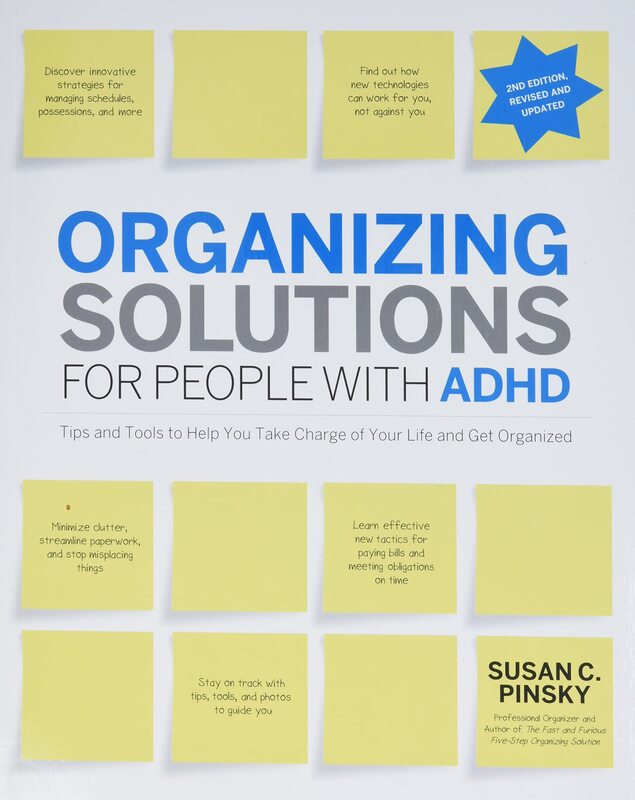AuthorDr. Carrie McMillin is a naturopathic physician that specializes in treating adults and children with ADHD and anxiety. Archives
February 2023
Categories
All
|
Back to Blog
I have a major complaint with the majority of books for ADHD: They aren't laid out in a way that's easy for ADHD brains to stay engaged!
However... I was so excited to open up Organizing Solutions for People With ADHD and find that it is a book that has helpful information AND is ADHD-friendly. Susan C. Pinsky got it right by creating a book that utilizes photos, breaks text into manageable chunks, and organizes sections in a way that makes it easy to jump from one topic to another depending on what is relevant to you. This is a book I highly recommend for people who are looking to set up some ADHD-friendly systems for staying more organized. You won't find a list of ways to make your space look pretty, but you will find easy ways to organize your stuff that is actually able to be maintained. While these techniques will be helpful for anyone, they are clearly created with executive function deficits in mind. So if you are running into a wall because every time you try to organize your space, the system doesn't last, check out Organizing Solutions for People With ADHD by Susan C. Pinsky. It is easily one of my favorite books to recommend to my patients!
Back to Blog
When Winter Break Derails ADHD Brains12/11/2022 4 Simple Things You Can Do to Make Going Back to Work or School Easier 1. Change out of pajamas
Your brain picks up all kinds of subconscious cues about your schedule and these have a big impact on your internal clock. When your internal clock gets thrown off it affects your ability to not only fall asleep, but your quality of sleep too. Often when we are in vacation mode it's easy to just hang out in your PJs until after lunch (or let's be real, all day). But changing out of your sleep clothes or vice-versa can be one of those subconscious cues that helps your brain maintain it's internal clock. Getting dressed in the morning can help you feel ready for the day and move into productive mode, just like changing into pajamas can be an important part of a bedtime routine which helps your body move into sleep mode. Even if you take a day to relax, maintaining your normal daily rhythm will pay dividends when it is time to get back to your regular work or school schedule. So keep up with a simple wardrobe change every day over this winter break and see how you feel! 2. Keep mealtimes consistent Zeitgeber is a fun word for naturally occurring cues like daylight and darkness that can affect our internal clock. Most people don't realize that mealtimes are incredibly powerful zeitgebers, and ones that we can pretty easily adjust when our internal clocks are out of sync. You may have a slightly different eating schedule on the weekend. Maybe you sleep a bit later and grab brunch at 11, instead of your usual light breakfast at 8 and lunch at 1. Chances are the 2-day weekend won't throw you off too much if you get back to your regular routine on Monday. But when you have extra holiday breaks sprinkled over a couple of weeks, your internal clock can pretty easily lose its rhythm. Try to keep mealtimes as close to your regular routine as possible. Even if you aren't able to have a full meal, grab a hard boiled egg or a protein waffle in the morning, snag a quick snack at lunchtime, and avoid eating dinner much later than you usually would--or at least try to limit it to one "off" day at a time instead of a series of them. 3. Avoid overscheduling I get it. ADHD brains often want to do ALL THE THINGS! But also, ADHD brains can be particularly sensitive to lots of stimuli. And when they get overstimulated, it can be super hard to reset. Keep an eye on your schedule and avoid scheduling too many events in a row. Instead, block off a "down day" in between bigger events to decompress and catch up with things like household chores or self-care which get pushed aside when you are in a rush to get somewhere. That extra day can help you prep for your next event so you feel less overwhelmed AND it gives your nervous system a rest! 4. Plan for a "dry run" No matter what your brain tells you, I can pretty much guarantee your first day back to school, work, or both will be stressful if you don't have a prep day. So block your calendar now with a note to remind yourself of this! I recommend blocking the day before your return, but if you have an event that can't be moved, block off the day before that. On your prep day, mentally go through what your morning routine will look like and put everything in place. Set backpacks by the door. If your family is like mine, take some time to clean out the backpack and find the lunch that has been there since the first day of break. Make sure you have groceries or a plan for breakfast, lunch and dinner for everyone--especially if you are trying to prioritize healthier foods for the new year! Check that everyone's clothes are cleaned and laid out, the car has gas, and whatever else you might need that day has been located and placed in a central location, ready to go. Now enjoy your last day of vacation knowing the morning will be a little less stressful! |
 RSS Feed
RSS Feed

